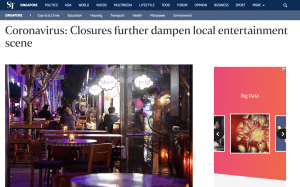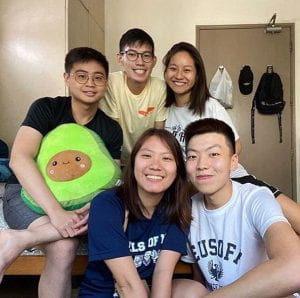“You’re being paid to risk your life. I would be lying if I said that the thought of it doesn’t scare me sometimes.” – Amber Lai
Although many affected by the pandemic have been forced to take on odd jobs to make ends meet, NUS Year Two Business student, Amber Lai, veered off onto a path few would even consider.
This is her third month serving as a COVID-19 swab tester, and she has had several memorable encounters. In this exclusive interview, she tells us more about her experiences in this role, the challenges she faces as a young frontline healthcare worker, as well as the sights you hardly see in the day-to-day.
Work Life of A Student Swab Tester
“There are some days when they call me in at 5A.M. You can’t really have other jobs because of this. They tell you the night before and you’re expected to show up the next day.”
Juggling school and work, Amber copes with her part-time job by scheduling all her classes in NUS after 3P.M. Each swab tester is rostered up to four to five times a week, and shifts typically end by mid-afternoon.
On the job, she swabs an average of 50 people a day. There is also a lot of downtime during each shift, which is when she gets to know her colleagues.
Amber names that as the best part of the job as she’s gotten to meet people from different backgrounds. Many of them are former club DJs and event planners who are swab testers by day and Grab Food delivery riders by night.
“It also feels good to help people and contribute to social responsibility”, Amber added.
Challenges Being A Frontline Worker
On the downside, the locations she is assigned to work at can be rather ulu (means remote in Malay). The swab tests are usually conducted in various car parks, and she’s even been sent to Tuas Link, which is near Malaysia’s borders.
However, this physical distance isn’t the one that pains her the most. Being a frontline worker, Amber often faces much discrimination and is shunned even by those dearest to her.
“One of my closest friends said that I’m dirty whenever I come back from work so she refuses to come near me until I take a shower”, Amber lamented, explaining how her friend became more cautious around her after finding out that she was a COVID-19 swab tester. “Of course, I wouldn’t want to pass the virus to them. But knowing that not everyone is fully supportive of my job can be a little isolating.”
After all, the government goes to great lengths to ensure that healthcare workers are well-protected. The swab procedure is very stringent and everyone in close contact with potential COVID-19 carriers have to wear special Personal Protective Equipment (PPE) suits. With these measures in place, one may even argue that the likelihood of contracting the virus is higher in public spaces, rather than on the job.
Each swab tester goes through months of training before they are able to conduct tests on patients. In this process, they not only learn how to swab, but why swabbing works and how swab samples are used to identify the virus.
Viral secretions are discharged at the back of the head, so the swab needs to go all the way into the nose or mouth to get a sufficient sample.
Although the act of swabbing seems scary, it is a quick process and each swab only takes about 20 seconds.
The worst that could happen is that a patient’s nose bleeds profusely. However, this usually only occurs when patients have a history of nose bleeding or surgery. In these situations, professionals suggest that they insert the swab through the mouth instead.
Amber likens the feeling of being swabbed to holding your breath: “There’s this panicky feeling of “I need to go up, I need to get air”, but it doesn’t hurt. It’s just slightly uncomfortable.”
COVID-19 in Singapore’s Society and Humanity
The uncertainty of dealing with the virus has understandably set our society and everyone around the world on edge. It has brought out the very best, but also the worst in humanity. Being a frontline worker, Amber has been on the receiving end of some unpleasantries, particularly from Singaporeans.
She recalls the first time she ever swabbed a patient – an incident she would never forget.
After confirming that it was Amber’s first day on the job, an elderly man she had just swabbed had refused to leave as he insisted that she had not swabbed him properly. It being his second time undergoing a swab test, he unfairly compared Amber’s skill level to that of his previous swabber and shouted at her supervisor to “train her [Amber] better”.
After he finally left, Amber’s supervisor assured her that she had carried out the procedure correctly, and that the elderly man was probably just taking out his irritation on her.
Not all Singaporeans have shown such resentment of course, but Amber could not help but note the difference between Singaporeans and international swab subjects.
Amber highlighted an incident when she met a migrant worker who was crying outside the tentage before he was swabbed for the sixth time.
He hadn’t been able to earn any money to send home because he had been quarantined in a hotel. Every week, he received the same letter informing him that the results for COVID-19 were inconclusive, thereby extending his quarantine period and anxiety.
Amber mused, “I can’t imagine what it’s like to be in his shoes. At least for me, I still have my family and friends here. ”
COVID-19: A Learning Point
The lives that our frontline workers lead is definitely one filled with sacrifice. Protecting the lives of others, they often risk their own. Yet, we easily take for granted the safety that they have so willingly traded their lives to ensure.
However, frontline workers are not the only ones affected. We have seen many people from all walks of life adjusting to the lifestyle changes that COVID-19 has brought about – from those shifting to home-based work, elderly who have been isolated due to social distancing measures, to the migrant workers who fear for their livelihoods.
Everyone is struggling at this time.
So, for us here in NUS, we can combat COVID-19 by simply remembering to wear our masks, and take our temperature twice daily.
Tough times can unite or divide, but if we all aim to be a little more considerate at times, we can all come out of this stronger, together.





